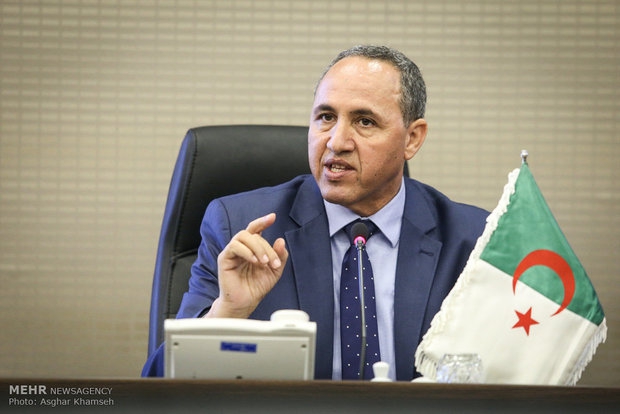Tuesday 20 December 2016 - 18:01
Story Code : 243684
Algerian Min. of Culture: To celebrate Hafiz is to celebrate love, humanity
Mr. Mayhoubi was in Tehran to officially open Algerian Cultural Week, an initiative of Iran�s Ministry of Culture and Mr. Seyyed Reza Salehi Amiri himself attended the ceremony on last Monday in Iran�s National Library.�Somayeh Khomarbaghi of Mehr News International Service reached Mr. Mayhoubi for a short interview on prospects of cultural ties between Iran and Algeria:
Cultural common grounds provide nations and states means to improve ties; how would you see this issue in terms of Iran-Algerian ties? What has been done so far to improve bilateral cultural relations?
The cultural events jointly held indicate a political will in both capitals for an all-out development; both countries waged honest efforts to work in cultural matters, as a bridge through which other sorts of relations crosses; the stronger this bridge, the better will be the economic and political ties and exchanges. Both presidents relied on this premise to bolster relations in all issues of interest.
Algeria had been participating in cultural events in recent years to introduce its culture, heritage, and civilization to Iran; culture occupies an important place, and the agreement on cultural cooperation signed December 25 2014 was a milestone of such exchanges; the second meeting of high commission in December 2015, chaired by Abdelmalek Sellal, the Prime Minister and Mr. Is'hagh�Jahangiri, Iran�s First Deputy-President, provided a yet stronger framework for cultural cooperation. The same meeting also was a venue where detailed plans for 2016-2018 were signed as an effective roadmap, and which would help more dynamism in cooperation. For example, commemorating famous 14th century Iranian poet� Hafiz of Shiraz right in Algerian capital as the one hundredth such event, is to celebrate the human different modes of love and being loved and a great innovation by our cultural officials.
Do you think that what would improve bilateral cultural ties with Iran? And what are the major barriers?
In meeting with Mr. Salehi Amiri, I discussed preparing a roadmap to improve cultural relations; we also signed agreement in cinema, music, and other fine arts; we agreed that both countries� intelligentsia would participate in joint sessions to address important cultural issues, which are also a challenge to other societies and nations, including terrorism and extremism, along the pressures mounted by the west.�To tackle barriers on the way to happier future in a world of peaceful symbiosis, and where tolerance opens the rooms for friendship; critical thinking is the only way to face threats of reactionary thoughts and a groundless fear of what is to come; we should promote culture of mutual trust and a culture which looks forward.
Geographical and lingual barriers are no longer adversely affect cultural ties with Iran. The only problem would be of linguistic nature where communication would be slow and lethargic; on the face of this, both countries, I believe have a real will for better ties in the future.
How would a culture of fighting colonialism and imperialism would contribute to convergence of both countries?
Both Iran and Algeria resisted colonialist forces to save their countries; Algeria cherishes the model Iran presents in cultural resistance; art and culture are as a strong weapons in form of cinema, theatre, music, literature, visual arts, and other expressionistic and symbolistic art; in the age of globalization and its huge waves sweeping local identities, we should use these parameters to save native cultures and the heritage of centuries we inherited from the past.
What Iran and Algeria can do to fight terrorism and to tackle the very roots and causes of the evil?
A culture of dialogue as an instrument of converging ideas acts as a bridge for more understanding and peaceful co-existence, especially in a region so volatile as the Middle East, where sectarian violence and hatred, along with extreme forms of tribalism, have contributed to a chaos already besetting the nations� odds of better days; terrorism and extremism should be addressed in terms of its roots; political turmoil, social underrepresentation, cultural marginalization, and economic deprivations are among the major roots of a situation where individuals take extremes in controlling the situation and to change the conditions in their own favor, however with whatever violent means. In such a failed state, individuals begin to hate others who they believe are cause of their plights and who they deem as the major party to direct the blame; Takfirism is fostered in such desperate situations. To address this evil, effective education and a working state system should at work; individuals should be inculcated with a culture of tolerance and listening to the others� voices; on this, the states should not be alone and the intellectuals and elites should come closer to realities by abandoning their ivory tower of abstractionist aestheticism, and to provide the society with their knowledge to help it avoid extreme situations.
Interview by: Somayyeh Khomarbaghi
# Tags











